What's the Greatest Video Game: Dice Legacy
By imunbeatable80 0 Comments
This is an ongoing list where I attempt to do the following: Play, Complete, and Rank every video game in the known universe in order to finally answer the age old question "What is the greatest game of all time?" For previous entries find the links on the attached spreadsheet.
How did I do?
| Category | Completion level |
|---|---|
| Completed | Yes |
| Hours played | 6-10 |
There are few things that I like more then combining my two favorite hobbies (Video Games and Board Games), and while there are hundreds of games in both sphere that mix aspects of those categories to some degree, I am always looking for the next obsession for myself. Now some of those games aren’t as apparent as others, and a lot of games might hide dice rolls and stat checks behind the scenes. I go to it a lot, but one of my favorite games X-Com 2 is essentially a glorified board game. You take turns against another player, moving pieces on a board, and then taking an action or rolling a dice to see a result. All of that is hidden very well, but if you took the elements out of the game, you could very easily conceive a board game out of the same game, and it would play nearly the same. Now why do I bring this up, well because the game I am talking about is trying to mix those categories in a more observable manor. We are talking about the game Dice Legacy today.
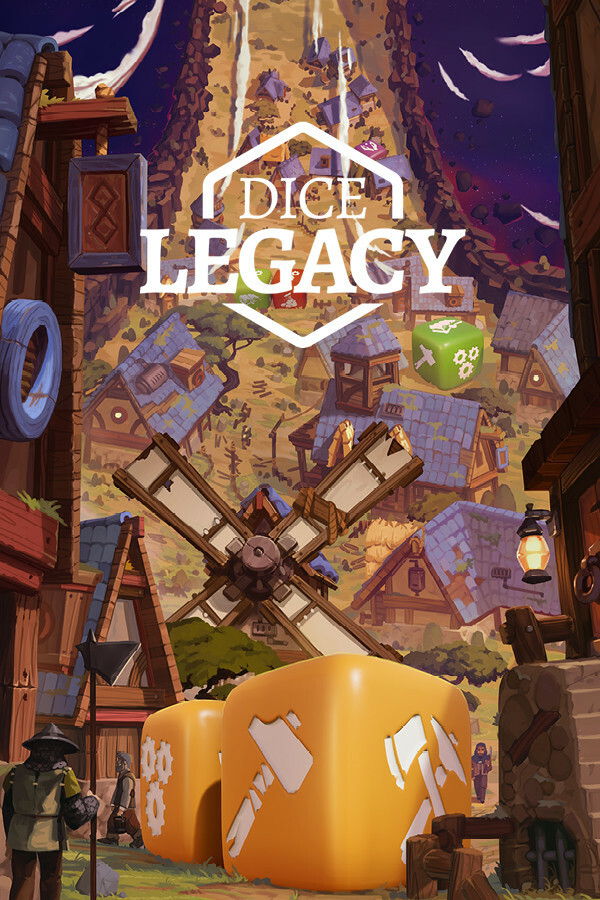
Dice Legacy is a game that sees your “civilization” crashed ashore a mystical ring world and you are tasked with not only surviving the world, but exploring it fully. You will slowly build up infrastructure that can help you survive harsh winters, turn wheat into food, and train researchers to advance your tech tree. If you are thinking this game perhaps sounds a little like Civ, then you are correct, there are certainly some aspects of this game that were borrowed or inspired from Civ. However, there is one huge glaring difference in this game.. your citizens are actual dice. Every citizen is represented by a dice in the game and you roll them in order to determine what they are going to do. For instance you start this game with only peasants and the peasant dice have the following sides: 2 Harvest sides, build, fight, work, scout. If you roll a harvest, you can have that peasant gather lumber or mine stone. Build and fight sides are self-explanatory, but a work side means they can work in the wheat fields or work in a mill, and scouting allows them to investigate anomalies you find on the map, or help expand your boarders. If you roll something you don’t need, you can always re-roll that dice, but every roll will use up 1 durability on the dice, so you want to be smart about that.
Without diving into the weeds just yet, the world you are on is incredibly linear. This is not a globe, but rather a fairly narrow ring. At your back is water from which you landed and in front of you is your goal. While each playthrough is going to have randomized placement of resources, the world is always the same shape and your enemy always starts at the other end of the map. This means that when you are building your base of operations, looking to scout ahead, or deciding where to put defensive positions it is almost exclusively right in front of you. There are no mountains to the left, or a choke point south east, or hidden resources that you need to scour for. You will build in a relative straight line, and you will explore farther in that straight line. While it is certainly interesting in concept to have a ring world (I know halo has done it), it does end up killing re-playability since every session will have you building and progressing in the same direction.
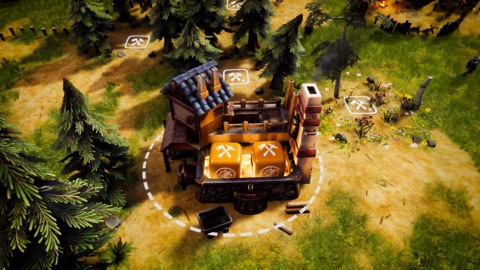
Now some of the game operates exactly how you would expect. Resources that you gather then are used to build various infrastructure. Building a mill takes wood and stone, but will allow you to convert wheat into food. Food can be used to refresh the durability of dice. Building a house allows you to create new peasant dice to use in the game and building a school can covert peasant dice to citizens which are entirely new dice with different abilities. For most of the game you are playing a balancing act between what your small time goals are versus constantly moving forward. Since every dice roll cuts into durability you want to try and utilize every side you roll while keeping in mind that you need stone for the next building you want, or builders to complete towers. There is a tech tree that opens up a little bit later on in each run, but will allow you to research newer buildings that you can use to benefit your crew, or simple upgrades to stuff you are already doing. You can focus on researching harvesting, so that each peasant that goes to chop wood brings back 3 resources instead of 1, or instead use it to focus on making your buildings more efficient. On top of just balancing resources, there is a morality meter for each class of dice. If your peasants are happy, they harvest more material. If they are unhappy, they might start fires to some of your buildings to riot.
Balancing that happiness is all about what is happening in your town. Having any dice die off through durability or an event, makes that group slightly unhappy, while creating dice in their class makes them happy. There are other items that move the needle but I won’t bore you with all the details here. Where the morality becomes important is that to create dice of another class, you almost always need to convert another dice. So a Peasant can turn into a soldier, or a merchant, and while that will make whatever group they become happier, it will also make the peasants unhappier. You need to be cognizant of what each meter is at and attempt to make sure one group doesn’t feel ostracized because the unhappy effect for each dice does not mean game-over, it is simply something that you want to avoid. Lets just say the happier the people of your civilization the easier you will find the game.
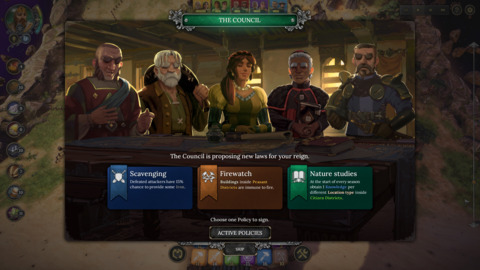
Now the game is not just about creating a thriving civilization, and while that will make your job easier to manage, the end goal is to find the end of the ring world, and destroy its king. As you get closer and closer to their base of operation, you will start to get attacked more and more, but the game only ends one way and that is to destroy the fortress at the other end of the ring world or to be destroyed yourself. It is sadly an anticlimactic way to end however long each of your playthroughs are. Unlike Civ, where you can focus on being religious, or technically dominant, Dice Legacy only wants you to kill at the end of the day. It doesn’t matter how great of a town you built or how happy your dice classes are, the end will just have you rolling swords to place on your opponent’s base or building a catapult and rolling the necessary dice to launch that at your opposing base. Destroy their base and credits roll and you beat the game. My first playthrough took me roughly 6 hours to beat the game, and each subsequent run was cut down in time as you realize what is a waste of time to build or invest in.
In my first playthrough with Dice Legacy I had a fairly good time with the game. It played like a streamlined version of Civ (to a point) and I enjoyed that balance of moving forward and building up to the end. However, this is one of those games where you can get everything you need out of the game in 1 playthrough as the incentive to play more dwindles each time. While there is a version of picking a CIV to start your game, in this case picking a King, they all need to be unlocked and their main difference is starting you with different dice each time. Each King does have a special power that can activate should you roll the right combination of dice, but in all my playthroughs with the game, I never found a power that was important enough to either aim for, or to even use once I rolled it. In addition to that, your enemy is always the same. This is not a game where you might fight Abraham Lincoln, or Quetzalcoatl in the end, which might have unique units or better resource gathering then you, but instead you will always fight the same cursed king. With the world being setup in the same way as well, means that you might get sick of always progressing in the same direction and knowing about how far you have until you stumble upon the first enemy buildings.
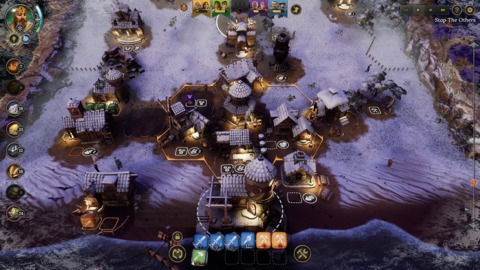
Finally once you know the systems in place, the game can be easily exploited and its hard to unsee those techniques for subsequent playthroughs. For instance, the game progresses through seasons, with Winter being the worst. In Winter, there is a chance that dice can freeze when you send them out to do work at various locations. These dice while frozen can’t be used again until the un-freeze. They can unfreeze in a tavern, through a temple, or by waiting until Winter is over. There are a bunch of things that can make Winter go smoothly, such as building heaters for the town, or spending your research points to lower the freezing %, but I will tell you the real secret right now… Do nothing. Yes, that’s right.. if you never put a dice out, it can’t freeze. Your town does not use resources on its own. There is no food tax or wood tax that gets taken out based on how many buildings you have. You can just fast forward time and skip Winter and skip all the harmful effects it causes. Trust me, the first winter you hit in the game is early enough in your playthrough that unless you are playing on super difficult, or a different mode, you don’t need to engage with at all. When I first started, I was burning through resources to keep generators running so my dice wouldn’t freeze, but then sending out peasants just to restock resources that I lost due to the generators. I was operating as if these dice needed to eat and stay warm to live, but in the end, I probably used as many resources as I gained during that time, and all I did was burn durability of dice, and wood that I could have used to build buildings. But, if you just fast forward through Winter, barring an attack by outsiders, your town will be just as good as it was in the Spring with the added benefit of knowing you didn’t lose resources for no good reason. For subsequent Winters, you might need to employ different tactics, but you should be better stocked by then.
I’m also going to let you in on another hint that makes this game more enjoyable. The Max dice is not really the max amount of dice you can have. At the start of the game you probably start with 5 dice and see that 12 is the max you can have. When you start doing the math, you realize that 12 is a very low number for what you need to accomplish. 12 dice divided by 5 different classes means you maybe get two dice a class, and some things need to be operated by 3 dice or more. However, what the game doesn’t tell you (at least I didn’t see it) is that 12 dice is the amount of dice you can have in your hand at any one time. When a dice is out on the board being used for harvesting or building, it does not count as being in your hand. So, in essence you could have 50 dice total, and as long as you are fast enough you can keep them all in play. Combine this with the two settings that allow you to pause the game, and the ability to place and roll dice while the game is paused, and you can constantly be moving dice in and out without worrying about hitting that limit. Of course if you let your guard down and 14 dice end up back in your hand, the game forces you to kill off two dice, which means that class’s happiness will go down as well. It’s a risk-reward, but a necessary one, because trying to play this game while only using 12 dice sounds like a nightmare.
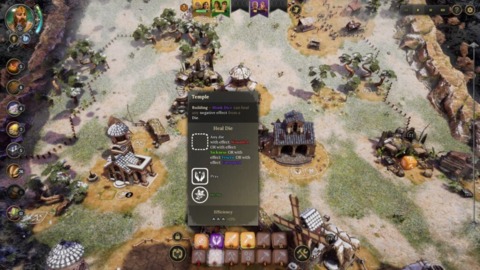
My final gripe with the game is that it comes with a bunch of different setup options that you unlock upon beating the game for the first time. What starts as a hidden promise that this game has great replay value, is quickly dashed when you realize that nearly all of these modes are just small modifiers to the original game. Playing the exact same game with less resources, or dice that are harder to please, is not really a reason to want to replay the game. When everything else still behaves the same way, why would I just want to play a mode that makes the game slightly more annoying, there are difficulty modifiers for that. Creating whole new modes, that equate to just ratcheting up the difficulty feels pointless to me. I felt that there was only one unique mode, which tasked you with fulfilling the wishes of your party otherwise they would oust you as King. In this mode you no longer care about marching towards the enemy, but trying to accomplish the tasks laid out in front of you. Fail too many of them and it is game over.
All in all, I wanted to like this game more then I ended up doing it. In fact the first playthrough of this game I was pretty hooked, because I didn't know what to expect. I even briefly thought that this game might be dangerous for me if the bonus modes and unlockable kings put a new spin on the game. Luckily for me, the game petered out pretty quickly after I beat it and I could move on to another game, but I think this game asks a very interesting question. How does a game fare if it is built with an eye towards re-playability, but the re-playability is the worst part? If this was just a single playthrough game that took you 6 hours and you rolled credits, but didn't offer any re-playability outside of starting the story mode over again, I think I would rank it higher, because I enjoyed those initial 6 hours. However, this game wants you to play it over again, and wants you to unlock all it has to offer, but it doesn't offer enough in terms of gameplay to warrant those replays. Sure you can have different dice, but you can't use those different dice for a different goal. Monks alone can't win you the game, so when you get to the late game, you are going to have roughly the same makeup of dice every single time, who cares if in the beginning you built the tavern first or the mill first, when you need to have both.
Is this the greatest game of all time?: No
Where does it rank: I don't have much more to add, I ranked this game as the 102nd Greatest Game of All Time it sits between "Miitopia" (103rd) and "Old Man's Journey" (101st). If you take anything away from this review, and get the game, my advice would be to stop at one playthrough. Whatever enjoyment you get out of that first playthrough will be the highest you will feel about the game.
Anyone looking for it: here is the link to the list and more if you are interested in following along with me (this is not a self promotion).Here. I added links on the spreadsheet for quick navigation. Now if you missed a blog of a game you want to read about, you can get to it quickly, rather than having to scroll through my previous blogs wondering when it came up.
Thanks for listening
